|
Continuing Privatization of BC Hydro
Oppose the Liberals' Pay-the-Rich
Schemes!
Continuing Privatization of BC Hydro
Oppose the Liberals' Pay-the-Rich Schemes!
- Charles Boylan -
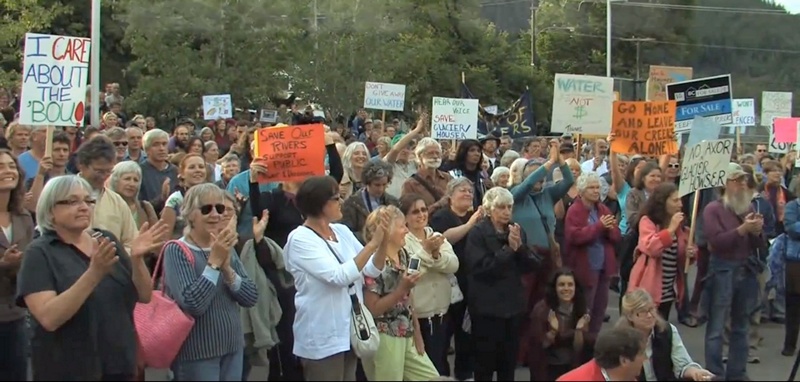 Mass rally in Kaslo
against sale of BC rivers to private power producers, June 23, 2009,
part of the ongoing campaign
Mass rally in Kaslo
against sale of BC rivers to private power producers, June 23, 2009,
part of the ongoing campaign
"Save Our Rivers" to oppose the privatization of public resources and
destruction of the environment.
One of the crimes of the Campbell/Clark neo-liberal
government against the people of British Columbia is the scheme to
force BC Hydro to purchase privately produced electricity at prices far
above its value. The recipients of this pay-the-rich scheme are
privately-owned Independent Power Producers (IPPs).
The Campbell Liberal government forced BC Hydro into this scheme in
2002 with virtually no public debate, and an opposition in the
legislature reduced to two seats. It is now continued by the Clark
government.
The Liberal government scheme, Energy for Our
future: A Plan for BC (2002) has the following features:
One -- the Liberal government privatized BC Hydro's
service delivery (administration and finance) by contracting it out to
Accenture, a global monopoly with worldwide gross annual income of $28
billion. Accenture was spun off from Arthur Andersen accounting
monopoly of the Enron scandal. About 1000
BC Hydro workers either lost their jobs or moved to Accenture. In 2012,
Accenture lost the contract to another monopoly, and those BC Hydro
workers who had been transferred to Accenture in 2002 lost their jobs.
Two -- the Liberal government prohibited BC Hydro from
producing any new power other than the upgrading of existing dams and
possibly the development of Site C on the Peace River. All new power
production was to be developed by private capitalists and sold to BC
Hydro in long term contracts. This massive
fraud created a gold rush of speculators applying for licenses to
produce power on hundreds of rivers throughout the province. These
run-of-the-river IPP projects have elicited a large number of
complaints from concerned residents because of the actual and potential
ecological damage.
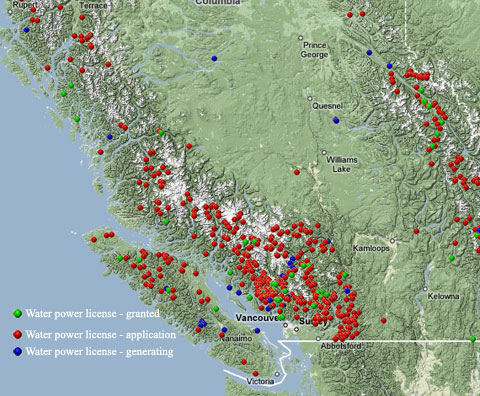
Map of private
power generation projects in BC --
click to enlarge.
|
Licences were sold for $5,000 to $10,000, thus handing
over BC's rivers to private capitalists for virtually nothing, who then
procured long term contracts with BC Hydro for very high prices. The
average IPP contract sells power to BC Hydro for $124 a megawatt hour
(MWH). This compares with BC Hydro's
selling price today of $40 per MWH to major industrial users, pulp
mills
and mines. The enormous loss to BC Hydro is to be made up with higher
prices to individual users and government subsidies. Whereas before the
public enterprise was a positive contributor to the public treasury
while providing electricity at some
of the lowest rates in the world, BC Hydro today is being turned into a
source of plunder for private interests and a drain on the public
treasury while demanding higher and higher prices for electricity
especially from individuals and small business purchasers.
Three -- the Liberal government scheme allows for coal
generating electricity.
Four -- BC Hydro was forced to follow U.S. market rules
allowing private exporters of power access to BC Hydro transmission
lines for personal gain.
Five -- BC Hydro was forced to separate its transmission
system from its generating system. This proved to be a $250 million
dollar fiasco. The Liberal government admitting the disaster reversed
this practice in 2010 with the Clean Energy Act.
Six -- the Liberal government eliminated the NDP
government's rate freeze on electricity, and allowed private producers
to sell directly to industry.
Seven -- even after BC Hydro pays outrageous prices for
IPP power, the public enterprise ends up gaining no new assets.
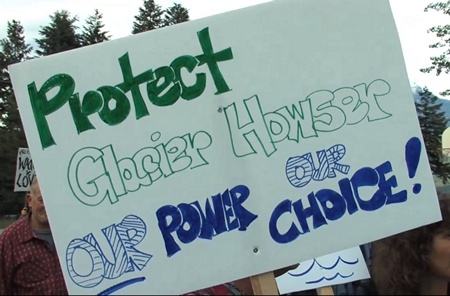 Eight -- The Liberal
government guaranteed high price
for contracted IPP power enables the private companies to borrow funds
to build the projects. This guarantee allows the big banks to lend
money to private interests at higher interest rates than they would
receive from government or BC Hydro direct borrowing.
The public ox was skinned yet again by private interests. During the
1960s and '70s when BC Hydro built its major dams, the government was
able to float loans on the money market at triple A rates, much lower
than could be charged to private power producers; although, why
Canadian governments with such
potential wealth at hand from Canada's enormous natural resources and
educated and skilled working class have to borrow from private
financiers or use private contracted companies at all for public
projects are other issues people should think about and question. Eight -- The Liberal
government guaranteed high price
for contracted IPP power enables the private companies to borrow funds
to build the projects. This guarantee allows the big banks to lend
money to private interests at higher interest rates than they would
receive from government or BC Hydro direct borrowing.
The public ox was skinned yet again by private interests. During the
1960s and '70s when BC Hydro built its major dams, the government was
able to float loans on the money market at triple A rates, much lower
than could be charged to private power producers; although, why
Canadian governments with such
potential wealth at hand from Canada's enormous natural resources and
educated and skilled working class have to borrow from private
financiers or use private contracted companies at all for public
projects are other issues people should think about and question.
Nine -- as widely predicted, the IPP capitalists who
joined the gold rush of run-of-river power production quickly flipped
their investments for big scores to the giant monopolies such as
General Electric and others who have now become the dominant
players.
The people of BC need to respond with one voice: Stop
Paying the Rich! Defeat the Clark neo-liberal regime on May 14!
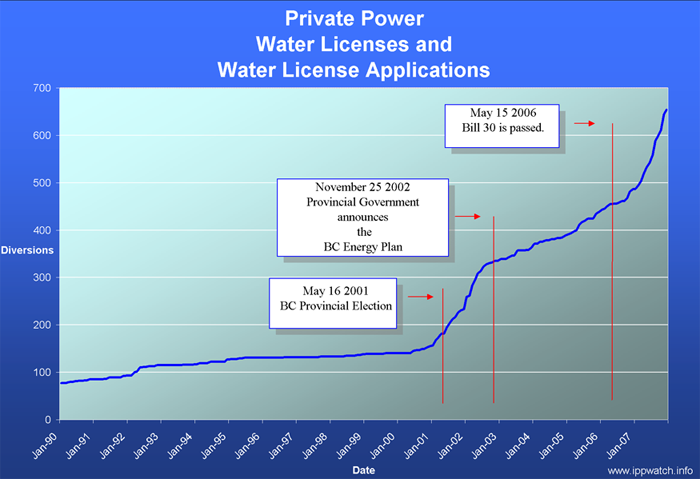 Quickening pace of
private hydro projects in BC since the 2002 BC Energy Plan and Bill 30
in 2006, which removed local government jurisdiction to disallow energy
projects by means of zoning on Crown land.
Quickening pace of
private hydro projects in BC since the 2002 BC Energy Plan and Bill 30
in 2006, which removed local government jurisdiction to disallow energy
projects by means of zoning on Crown land.

Broadcaster and Documentary Filmmaker Tour Four Cities
on Water, Electricity and Democracy
- The Common Sense Canadian -
In the lead-up to the BC election, Common Sense
Canadian co-founders Rafe Mair and Damien Gillis are travelling
to four BC communities -- Kamloops, Merritt, Williams Lake and Prince
George -- to discuss key issues shaping the future of our province. The
multi-media presentations, titled "WATER
+ POWER: The Future of BC's Energy, Environment and Democracy," will
include video clips from filmmaker Gillis, a speech by Mair and an
audience q & a session.
On the agenda is a web of proposed energy projects which
represent the vision of both our provincial and federal governments for
the economic future of BC -- all with profound impacts on our vital
freshwater and coastline. The discussion will cover everything from
proposed oil and gas pipelines to fracking,
Site C Dam, Liquefied Natural Gas (LNG) and private river power
projects -- to an alternate vision for managing BC's resources and
economy to the benefit of the public and environment.
The non-partisan events will scrutinize the BC Liberals'
economic and environmental record over the past decade, while examining
the NDP's policy positions on issues like the proposed Kinder
Morgan pipeline expansion to Vancouver and the nexus of Site C Dam,
natural gas "fracking" and the plan to build
a massive LNG industry on BC's coast.
"Our goal is to provide the public with accurate
information and connect the dots between interrelated projects of
enormous environment, social, cultural, and economic significance,"
says Gillis. "We're furthering a much-needed dialogue about the future
of our province at a key moment politically."
The details for the upcoming events are as follows:
April 23, 7 pm: Kamloops, BC @ Desert Garden
Seniors' Centre (540 Seymour St., Mojave Rm.)
April 24, 7 pm: Merritt, BC @ Merritt Civic
Centre (1950 Mamette Ave.)
May 8, 7 pm: Williams Lake, BC @ Williams Lake
Secondary School (640 Carson Dr.)
May 9, 7 pm: Prince George @ UNBC (stay tuned for
room information)
The Kamloops and Williams Lake events are co-hosted by
the local Council of Canadians chapters. All events are by donation.

Invest in Education! Education Is a Right!
Two Years Later, Teachers Are Still Seeking
Redress for
Rights' Violations
- BC Teachers' Federation, April 12, 2013
-
   Protest by BC teachers in
defence of their rights and the education system outside constituency
office of
Protest by BC teachers in
defence of their rights and the education system outside constituency
office of
BC Premier Christy Clark, March 28, 2013.
[It is] two years since the BC Supreme Court's
landmark decision ruling that legislation the BC Liberals enacted in
2002 violated teachers' Charter rights, and therefore is
unconstitutional and invalid.
On April 13, 2011 the BC Teachers' Federation won a
major victory in its decade-long court battle to overturn legislation
which stripped teachers' collective agreements of protections for class
sizes, as well as guarantees of support for students with special
needs. The bills had disastrous consequences for teaching
and learning conditions across the province because they enabled
government to make severe cuts to the public education budget.
Government documents introduced as evidence in court calculated those
cuts to be more than $275 million per year in 2001 dollars, an
estimated $330 million annually in current dollars.
The Supreme Court gave
government one year to deal with
the repercussions of its ruling but now -- two years later -- the BC
Liberals
have still done nothing to redress the breach. As a result, the BCTF
has been compelled to go back to court seeking a fair remedy.
"The Supreme Court affirmed our collective bargaining
rights and gave us hope that a decade of struggling to meet our
students' needs might be coming to an end," said BCTF President Susan
Lambert. "Two years later, we are still urging the government to act on
this important ruling and restore the services
our students need and deserve."
Then-Education Minister Christy Clark brought in the
unconstitutional bills in 2002. During her tenure as premier, the BCTF
has repeatedly appealed to her not to make students wait yet another
year in underfunded schools and overcrowded classes.
"This generation of students has really suffered the
negative impacts of this unconstitutional legislation," Lambert said.
"Children who were in Kindergarten when these bills were imposed are
now in Grade 12. Throughout their entire school careers their teachers
have had to fight for the classroom conditions and
learning resources to meet their needs, and their parents have had to
raise more and more funds to bridge the gap between children's needs
and inadequate ministry funding."
The BCTF is seeking restoration of the contractual
provisions that were unconstitutionally deleted from the teachers'
collective agreement, a declaration that the provincial government has
failed to address the repercussions of the decision, and damages for
losses suffered. The case will be heard in BC Supreme
Court beginning September 2013.


Blame Liberal Government Not School Board for
Job
Losses in District 43
- Brian Sproule -
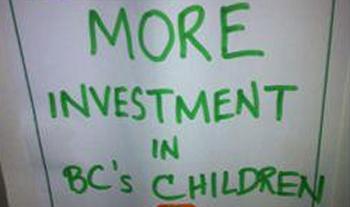 Eighty-one teachers, 19
teacher aids, 32 clerical and
custodial positions and 10 administrative positions are to be
eliminated from School District 43 (covering the cities of Coquitlam,
Port Coquitlam and Port Moody, and the villages of Anmore and
Belcarra).
Officials have announced the elimination of these 142
jobs in the district to make up for a $12.1 million projected operating
deficit in the 2013/2014 school year. It is six per cent of current
staff. The lost positions will result in increased class sizes and
workloads for remaining teachers and staff. Eighty-one teachers, 19
teacher aids, 32 clerical and
custodial positions and 10 administrative positions are to be
eliminated from School District 43 (covering the cities of Coquitlam,
Port Coquitlam and Port Moody, and the villages of Anmore and
Belcarra).
Officials have announced the elimination of these 142
jobs in the district to make up for a $12.1 million projected operating
deficit in the 2013/2014 school year. It is six per cent of current
staff. The lost positions will result in increased class sizes and
workloads for remaining teachers and staff.
Certain elements in the
mass media have pointed fingers
at the elected school board for alleged financial mismanagement and
lack of foresight. The April 19 edition of the Tri-City News
(Black Press) in an editorial entitled "Who will pay?" blamed the Board
for the massive and growing deficit and
went so far as to print the names of all the Board members clearly
suggesting that they should be removed from office. There have also
been calls for a forensic audit of the Board's books.
The provincial Liberal government has underfunded
education for the last 12 years and demanded that school board budgets
be kept within the confines of government funding rather than meet the
education needs of the communities. When the Cowichan school board
refused to bow to the government dictate
it was fired just as the Social Credit government of William Bennett
fired the Vancouver School Board in 1985.
The BC Liberal government in the name of austerity has
been pursuing an anti-social offensive to pay the rich. Public funds
are being handed over to corporations in the form of grants,
public-private partnerships, bailouts, privatization of public assets
and lower corporate taxes while education, health care, and
social programs are cut. The Liberal Government through its anti-social
actions rejects the government's social responsibility to care for the
sick, injured, youth and elderly and general interests of society.
The difficult situation in School District 43 reflects
the underfunding of public education and the general transfer of funds
from the social needs of the people into the coffers of the rich. That
is the fault of the BC Liberal government not the local School Board.
Those in the mass media pointing fingers at the
School Board for the layoffs are trying to deflect attention away from
the consequences of the Liberal government's anti-social offensive and
save it from defeat in the provincial election. It will not wash! The
blame lies squarely with the Liberal Government not the School Board.
On May 14, voters are determined
to throw out the perpetrators of the anti-social offensive and their
attacks on public education.
Defeat the Clark Liberal Government May
14!
Stop Paying the Rich!
Increase Investments in Social Programs!

For Your Information
Better Schools for BC: The Numbers Tell the Story
- BC Teachers' Federation -

Invest in Social Programs!
Ten Dollar a Day Childcare Advocates Urge Major Social
Program as BC Election Issue
- Coalition of Childcare Advocates of BC
-
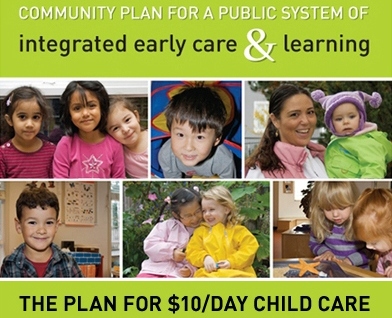 Increased investments in social programs such
as early
child care and learning and actions to stop handing billions of dollars
over to the resource extraction and private power monopolies are
essential to reversing the anti-social, neo-liberal attacks on the
polity enacted by the neo-liberal government of Christy
Clark and her predecessor, Gordon Campbell, over the past decade. Increased investments in social programs such
as early
child care and learning and actions to stop handing billions of dollars
over to the resource extraction and private power monopolies are
essential to reversing the anti-social, neo-liberal attacks on the
polity enacted by the neo-liberal government of Christy
Clark and her predecessor, Gordon Campbell, over the past decade.
The Coalition of Childcare Advocates of BC has been
organizing support across the province for "investment" in "a
community based, non-profit child care system that is high quality,
affordable, accessible, publicly funded and accountable."
On April 18, they issued a press release on the
occasion of the leader of the opposition releasing a response to its
well documented need for action on early care and learning, the text of
which is below.
***
"The initiatives tabled in the NDP platform are good
first steps" said Sharon Gregson, spokesperson for the Coalition of
Child Care Advocates (CCCABC). Most importantly they recognize and
address the high cost of parent fees for families with very
young children and the need
for more quality spaces. (NDP leader Adrian) Dix acknowledges that
child care is the 2nd highest expense next to housing for families and
lack of child care is a major barrier for women re-entering the
workforce.
The CCCABC with the Early Childhood Educators of BC has
been calling for a commitment from government to address: high fees
which have reached $1900/month per child; too few licensed spaces; and
poverty wages for the mostly women working in child care programs.
The $10/day Plan developed
by these two organizations
has massive support across the province from parents, grandparents,
municipalities, school boards, labour unions, business, academics and
community groups representing over a million British Columbians.
Supporters of the Plan know the importance of
quality experiences for children in their early years. They also agree
with economists that child care enables parents to participate in the
work force, contribute tax revenues and stimulate the BC economy.
Key elements of the NDP announcement today align with
the goals of the $10/day Plan. Specifically,
Fee reduction -- the CCCABC calls for fees reduced to
$10/day in all infant toddler licensed spaces so a 20% reduction is a
start. We recognize that parents, particularly of very young children,
need help now. That said, we will continue to push forward and increase
momentum for the $10/day Plan.
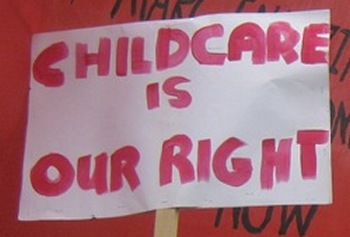 Accessibility -- the Plan
calls for significant numbers
of new spaces. This will need to increase over time. Accessibility -- the Plan
calls for significant numbers
of new spaces. This will need to increase over time.
During the initial planning process identified by the
NDP, the CCCABC would continue to advocate for the $10 /Day Plan. This
includes moving child care into the Ministry of Education, lowering
parent fees, creating more quality spaces and providing a living wage
for early childhood educators.
While many were hoping for a commitment to the $10/day
Plan we acknowledge this is a substantive move in the right direction
and will do more for families than unproductive tax credits and
registries. We encourage all political parties to commit to solving the
child care crisis and we are ready, willing and
able to work with a new government to achieve the child care system BC
families need.
Sharon Gregson, spokesperson for the Coalition of Child
Care Advocates of B.C. can be contacted at 604-505-5725. More
information can be found at: www.cccabc.bc.ca/plan.

Coming Events -- Join In!
BC Federation of Labour Plans "We Vote" Receptions
The BC Federation of Labour, among other things, has
been organizing a series of "We Vote" events to discuss the issues in
the BC election. Here is the most recent schedule:
We Vote Lunch:
Burnaby Lougheed
Saturday, April 27 -- 11:30 am
Eagle Creek Bar and Grill, Burnaby Mountain 7600 Halifax
St. RSVP: dgbaker@bcfed.ca
We Vote Reception: Surrey
Saturday, April 27 -- 6:30 pm
Pacific Inn, 1160 King George Blvd. RSVP dgbaker@bcfed.ca
BCFED Reception: Courtenay
Wednesday, April 24 -- 7:00 pm
Zocalo Cafe, 208 5 St.

PREVIOUS
ISSUES | HOME
Read BC Worker
Website: www.cpcml.ca
Email: office@cpcml.ca
|

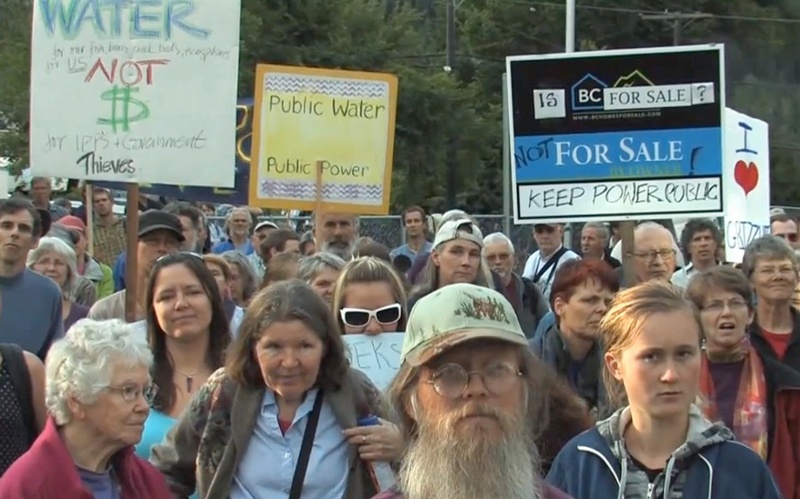



 Eight -- The Liberal
government guaranteed high price
for contracted IPP power enables the private companies to borrow funds
to build the projects. This guarantee allows the big banks to lend
money to private interests at higher interest rates than they would
receive from government or BC Hydro direct borrowing.
The public ox was skinned yet again by private interests. During the
1960s and '70s when BC Hydro built its major dams, the government was
able to float loans on the money market at triple A rates, much lower
than could be charged to private power producers; although, why
Canadian governments with such
potential wealth at hand from Canada's enormous natural resources and
educated and skilled working class have to borrow from private
financiers or use private contracted companies at all for public
projects are other issues people should think about and question.
Eight -- The Liberal
government guaranteed high price
for contracted IPP power enables the private companies to borrow funds
to build the projects. This guarantee allows the big banks to lend
money to private interests at higher interest rates than they would
receive from government or BC Hydro direct borrowing.
The public ox was skinned yet again by private interests. During the
1960s and '70s when BC Hydro built its major dams, the government was
able to float loans on the money market at triple A rates, much lower
than could be charged to private power producers; although, why
Canadian governments with such
potential wealth at hand from Canada's enormous natural resources and
educated and skilled working class have to borrow from private
financiers or use private contracted companies at all for public
projects are other issues people should think about and question.




 Eighty-one teachers, 19
teacher aids, 32 clerical and
custodial positions and 10 administrative positions are to be
eliminated from School District 43 (covering the cities of Coquitlam,
Port Coquitlam and Port Moody, and the villages of Anmore and
Belcarra).
Officials have announced the elimination of these 142
jobs in the district to make up for a $12.1 million projected operating
deficit in the 2013/2014 school year. It is six per cent of current
staff. The lost positions will result in increased class sizes and
workloads for remaining teachers and staff.
Eighty-one teachers, 19
teacher aids, 32 clerical and
custodial positions and 10 administrative positions are to be
eliminated from School District 43 (covering the cities of Coquitlam,
Port Coquitlam and Port Moody, and the villages of Anmore and
Belcarra).
Officials have announced the elimination of these 142
jobs in the district to make up for a $12.1 million projected operating
deficit in the 2013/2014 school year. It is six per cent of current
staff. The lost positions will result in increased class sizes and
workloads for remaining teachers and staff.
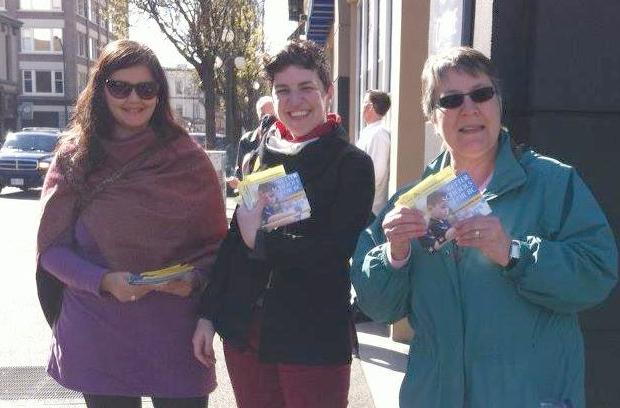

 Increased investments in social programs such
as early
child care and learning and actions to stop handing billions of dollars
over to the resource extraction and private power monopolies are
essential to reversing the anti-social, neo-liberal attacks on the
polity enacted by the neo-liberal government of Christy
Clark and her predecessor, Gordon Campbell, over the past decade.
Increased investments in social programs such
as early
child care and learning and actions to stop handing billions of dollars
over to the resource extraction and private power monopolies are
essential to reversing the anti-social, neo-liberal attacks on the
polity enacted by the neo-liberal government of Christy
Clark and her predecessor, Gordon Campbell, over the past decade.